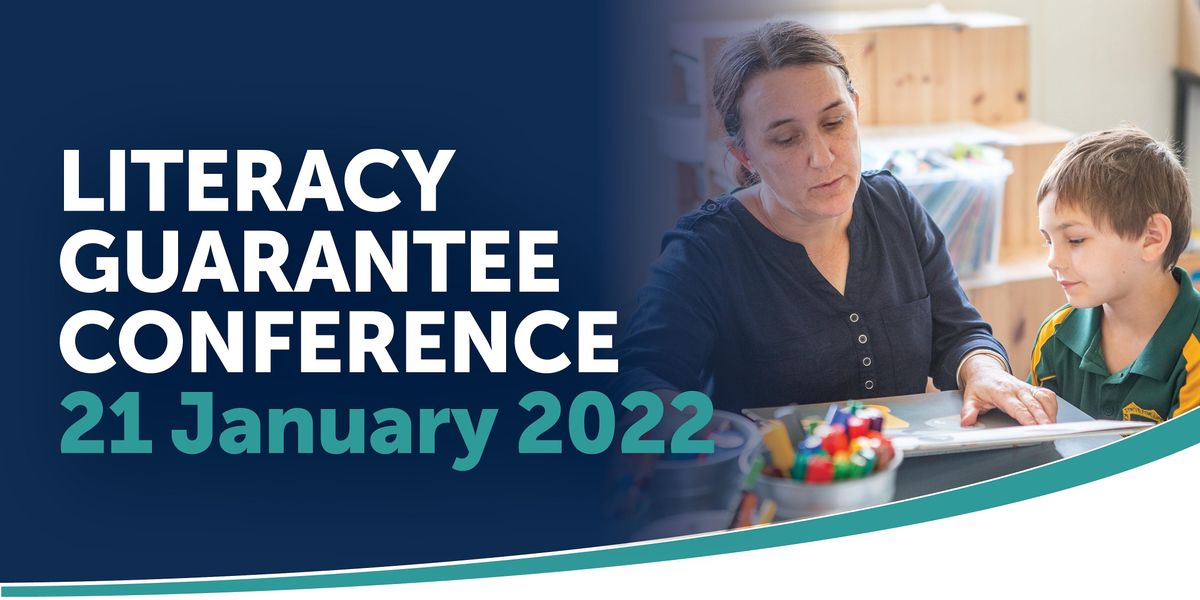
About this Event
Educational leaders and teachers from the Department for Education, Catholic Education SA and the Association of Independent Schools of SA are invited to attend the next Literacy Guarantee Conference which will feature a range of leading experts in literacy to support leaders and teachers more effectively meet the needs of all students.
Keynote address: Dr Bartek RajkowskiSpeech-Language Pathologist
Director, Adelaide Speech Pathology
Why teachers of English spelling need to be experts in the sounds of speech
Have you ever told a student that a word is spelled a certain way because English is weird?
In this keynote, Speech and Language Pathologist Dr Bartek Rajkowski will convince you that written English has an undeserved reputation for being illogical. He will explain why English words are spelled the way they are, and why teaching kids to read and spell requires us to be experts in understanding the relationship between English speech sounds and spelling.
After this presentation, participants will have a better understanding of:
• How the history of the English language is reflected in our spelling system
• Core skills involved in developing the ability to crack the code in written English
• Why evidence-based teaching of reading and spelling requires expert knowledge of the sounds of speech, especially when teaching students with reading and spelling difficulties
Bartek is a speech & language pathologist with extensive experience in the assessment, identification and remediation of reading and spelling difficulties. He is the director of Adelaide Speech Pathology Services where he has led a team of like-minded clinicians since 2001. Bartek is also the creator of Reading Doctor, a popular suite of evidence-based, interactive teaching tools designed to improve literacy skills in students who are learning to read.
Following his doctoral research investigating the relationship between phonological processing, orthographic processing and reading difficulties, Bartek developed a passion for helping teachers improve their knowledge of the structure of the English language, reading research and reading difficulties. He regularly presents his workshops to audiences around Australia and to speech & language pathology students as a casual lecturer at Flinders University.
Bartek is a prominent advocate for students with learning difficulties and has been involved with various lobby groups, including the team that helped persuade the Australian Government to implement the Year 1 Phonics Check. In 2020, Bartek was awarded Learning Difficulties Australia’s Mona Tobias Award, which is given in recognition of ‘an outstanding contribution to Australian education of people with learning difficulties’.
Breakout Sessions
1. Building an understanding of learning difficulties and dyslexia
Participants will develop a deeper understanding of:
• the range of learning difficulties teachers may encounter in the classroom including dyslexia
• how to identify students with learning difficulties and dyslexia
Participants will then explore a range of classroom practices that will support students with learning difficulties to fully engage with and access the curriculum.
Target audience: Early Years / Primary / Secondary
2. Catching them before they fall – dyslexia in the classroom
Participants will examine and deepen their understanding of the characteristics of dyslexia and use a case study approach to identify students’ with dyslexia across year levels. Attendees will be introduced to strategies that address the needs of these learners across the learning continuum.
Key concepts:
• tools to identify dyslexia and reading difficulties
• characteristics of dyslexia in the early years, primary and secondary contexts
key strategies to address these learning needs in a mainstream classroom.
Target Audience: Early Years / Primary / Secondary
3. Aim and fire: targeting phonological awareness
Participants will develop a deeper understanding of:
• two different diagnostic assessments available to assess PA
• analysing students’ assessment results to identify specific skill deficits in phonological awareness
• designing targeted instruction to address specific needs of groups of students
Participants will explore a range of practical strategies which support the development of advanced phonemic awareness skills.
Target audience: Early Years / Primary
4. Essential elements of a phonics lesson
Does your phonics lesson incorporate all the vital elements? If your answer is no, or you are unsure what the vital elements are, then this workshop is for you. The workshop takes participants through all essential elements of a systematic synthetic phonics lesson using the Literacy Guarantee Unit lesson plan. A range of practical examples will be shared. The workshop will be both theoretical and interactive.
Target audience: Early Years / Primary
5. Sound Walls and the importance of correct articulation in teaching children to read
Participants will develop a deeper understanding of:
• The articulatory features of the speech sounds of English.
• The importance of articulatory awareness in teaching children to read.
• The importance of correct articulation when teaching children to read.
• Schwa. What is it and how do we teach it?
• Using articulatory awareness to help children with b and d confusion.
Participants will then learn how sound walls can be used in the classroom to support the development of articulatory awareness and will learn how to set up and use a sound wall in a Junior Primary setting.
Participants will have access to resources which support the development of a sound wall and also assist children who struggle with b and d confusion.
Target audience: Early Years / Primary
6. The Fundamentals of Quality Spelling Instruction
Stuck for ideas to support spelling in the primary years? Tired of spelling lists and worksheets? In this workshop, we will look at evidence-based, practical activities to support spelling development. These activities can be used whole class and differentiated to suit the needs of all learners. We will look at spelling in the Australian Curriculum, provide lesson designing advice and explore high impact activities to target the core elements of spelling- phonology, orthography, morphology and etymology.
Target audience: Primary
Event Venue & Nearby Stays
William Magarey Room, Adelaide Oval, War Memorial Drive, North Adelaide, Australia
AUD 50.00
